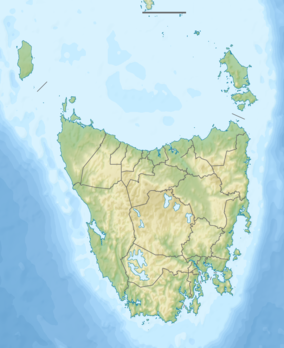Hebe Reef
Hebe Reef is a reef located about 5 kilometres (3.1 mi) northwest of the mouth of the Tamar River in Tasmania, Australia. Part of the reef is visible at low tide, however it is completely submerged at middle and high tide.
Hebe Reef | |
|---|---|
 Hebe Reef  Hebe Reef | |
| Coordinates: 41°3′20.41″S 146°43′53.44″E | |
| Location | Tasmania, Australia |
Hebe Reef's unsuspected location in the middle of what one would believe to be the channel to the river has deceived many, and numerous ships have been wrecked on its rocks.
Name
Hebe Reef was named after the first ship that struck the reef, Hebe. Hebe was "a full-rigged ship of 250 tons built at Chittagong, India in 1804".[1] The ship departed from Madras, India in late March 1808 and was destined for Sydney; when the decision was made on 15 June to turn into George Town, Tasmania - then Port Dalrymple - Hebe struck the reef due to a mixture of lack of knowledge and bad weather.
One person on the ship died, and most of its fittings and cargo were salvaged and sold in Sydney.
Ever since, the reef has been known as Hebe Reef.
Shipwrecks
There have been a total of six shipwrecks on Hebe Reef:
| Date | Ship | Departed | Destined for |
|---|---|---|---|
| 15 June 1808 | Hebe | Madras, India | Sydney |
| 24 January 1851 | Phillip Oakden | London | Exeter, Tasmania |
| 8 June 1883 | Asterope[2] | London | Launceston, Tasmania |
| 24 April 1886 | Esk | Hobart | Sydney |
| 6 January 1907 | Eden Holme[3] | Hobart | Launceston |
| 10 July 1995 | MV Iron Baron (1985) | Port Kembla (seaport) | Bell Bay, Tasmania |
References
- "Low Head Pilot Station: Shipwrecks on Hebe Reef". Low Head Pilot Station Maritime Museum. Retrieved 27 April 2018.
- "Asterope". Passengers In History: The South Australian Maritime Museum. Retrieved 28 April 2018.
- "SV Eden Holme (+1907)". Wreck Site. Retrieved 17 January 2022.